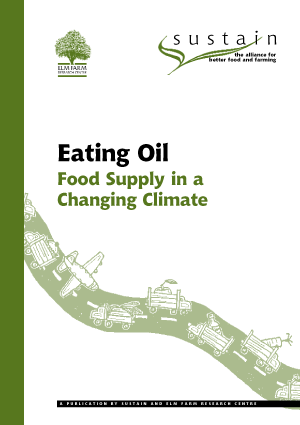Eating Oil: Food supply in a changing climate
Eating Oil takes a comprehensive look at how far our food travels and our dependency on imports and on fossil fuels to produce, process, package and distribute food. It shows how our food is travelling ever further both within the UK and through international trade. The fact-packed, 90-page report reveals how such trends could be reversed through industry, government and public action. In 2002 it received the prestigious Guild of Food Writers Award for Investigative Journalism, presented by Derek Cooper.
Report contents
Summary
1. The purpose of this report
2. The contemporary food system
3. Fuelling the food system - How dependent is our food supply on non-renewable energy?
- Households eating oil
- Producing the food
- Packaging and processing the food
-
Distributing the food
- International food trade on the increase
- Is organic food trade any better?
- The environmental efficiency of different forms of transport
- The problems of international freight transport
- The national food mile
- The shopper food mile
4. Eating oil: The risks
-
Oil is a finite resource
- The end of the ‘cheap and abundant oil’ era: consumption does lead to depletion
-
Stormy weather: the evidence and impact of climate change
- Climate change: the source of greenhouse gas emissions
- Climate change: The consequences
- Other polluting consequences of food miles
- Accidents will happen: Seabirds eating oil
- Nutritional implications of long distance food
- Monoculture: trading out diversity, variety and food security
- Misery Miles
- Importing disease and microbial miles
-
Food trade – help or hindrance to development?
- Case Study 1: Cocoa
- Case Study 2: Bananas
- Crude oil, food and human rights
5. A solution: Sustainable food supply chains
-
Linear and circular food supply chains
- Linear Food chains
- Circular food production systems
- The organic food sector
- Diversify production to shorten the food chain
- Applying the proximity principle: comparing local and global sourcing
6. How do we create a sustainable food system?
- The role of government
- Complementary approaches to re-localising the food supply
7. Conclusions
8. Recommendations for action
References
Contacts List
Published Thursday 1 January 2004
Food Facts: A series of short reports on over a dozen different products, shows how people's shopping choices - as well as government policy - can protect the environment, enhance social justice and improve health.
